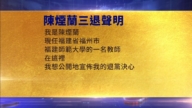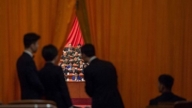【新唐人2013年03月09日訊】中國著名導演馮小剛,提議拍攝文化大革命題材電影,來對歷史進行反省。有文化評論人士認為,馮小剛的呼籲雖然有價值,但恐怕很難在新聞管制嚴厲的中國實現。
3月6號,馮小剛在中國文藝界小組討論上,以中共政協委員的身份建議:「大家既可以拍泰囧,同時也可以拍文化大革命這種題材。我認為拍這樣的電影是用來反省的,我們經歷過的這些事,是有好處的。」
但網友評論說,雖然很多中國民眾渴望揭開文革真相,但恐怕這是中共最不願意被碰觸的「死穴」之一。
中國詩人和文化評論家葉匡政:「 近十年以來,無論是文革還是反右,整個歷史,無論是出版還是電影都基本上不允許疏通。現在對這種歷史的控制不僅僅是對文革和反右,甚至對很多民國的歷史他都進行控制,就是不允許真實的表達。」
大陸自由作家顧先生認為,如果中共允許拍文革題材的電影,那麼說明電影內容一定是經過了「修飾」或歪曲事實,按照當局想灌輸給民眾的思想去表達,達到洗腦的效果。
江蘇網路作家顧先生:「 我覺得第一個不允許拍,如果真的允許拍的話,他也是要找理由,把這些東西要拓成一個主線:『黨是好的,只是黨中的一部分人不好。』總之把發生的問題推給少數人,而且是非主流的,而且要把黨表現的就像一個人一樣的,他盡力在救大家、救中國。就是要繼續愚民。」
馮小剛表示,「問孩子文化大革命的事情,他說不知道。其實現在很多年輕人都不知道。於是在砸車事件時,西安有人把司機從車裡揪出來打,這跟愛國沒有關係。如果不讓現在年輕人了解文化大革命,了解紅衛兵的暴動帶來的災難,再發生暴亂的時候,大家還是會呼的一下起來,大家會覺得拿磚頭砸玻璃是件過癮的事。」
對此,文化評論家葉匡政也有同感。
葉匡政:「 中國現在之所以碰到許多公眾事件,民眾仍然有這種文革時期的這種反應的話,很重要一個原因就是因為文革的苦難我們根本沒有經過清算,歷史的知識對於當下的人來說,它應該是一個很重要的教育或訓練,如果缺乏這種訓練的話,可能就失去了判斷自己今天行為的能力。」
葉匡政對中國電影也提出了他的看法。他表示,中國電影已經到了越來越差的境地,雖然去年有近千部故事片,但實際上,這些電影大部分都是沒有票房的,影響力很差,只有百分之三都不到的電影可以獲得榮譽。
葉匡政:「中國這百年以來,其實有大量史實是值得拍成電影的。包括髮生在文革中的很多故事,包括髮生在反右、大飢荒年代的故事,任何一個拿出來都是可以震撼世界的,但是因為這塊歷史現在不允許觸碰,就導致了中國現在電影空間非常少。」
評論人士普遍認為,中共嚴厲的新聞和文藝審查目地,是不讓民眾了解更多真實的情況,以維持它的統治。
顧先生:「如果真相揭開的話,那共產黨的執政合法性就一點沒有了。」
葉匡政:「比如講,你現在真實的表達民國,那麼很可能別人就會反思今天中國社會和當年民國的這種差距 ,如果你真實的表達50年代、60年代很多罪惡和苦難的話,可能當下的權力就會失去合法性。這個是它比較擔憂的一種情況吧。」
葉匡政奉勸中共當局,史實終究有曝光的一天,早一日暴露也許能早一天獲得人們的理解和原諒。
Appeal for Films on Cultural Revolution to Be Made
China’s famous film director, Feng Xiaogang, has suggested
the need to make movies on the Cultural Revolution.
This is to be able to reflect on this period of history.
Cultural commentators say that this appeal is valuable.
However, it is hard to be able to make
these under the strict censorship of the
Chinese Communist Party (CCP) regime.
At a panel meeting on March 6, Feng Xiaogang
made a proposal as a National Committee member
of the People’s Political Consultative Conference.
He said, “Since we could produce the film “Lost in Thailand”,
we can also shoot movies about the Cultural Revolution.
I think such films are good for retrospection,
and we have all experienced that era.”
Netizens commented that lots of Chinese people eagerly
want to know about the truth of the Cultural Revolution.
However, this is a taboo subject for the CCP authorities.
Ye Kuangzheng, cultural critic, China: “Publications
or films involving history over the last decade in China
rarely get approved due to the regimes censorship.
The censorship scope not only covers the era of the
Cultural Revolution and the Anti-Rightists Campaign.
It also covers the Republican period. That is,
productions telling the truth cannot get a green light.”
Mr. Gu, freelancer in China commented that if the films about
the Cultural Revolution can pass through CCP censorship,
it means that the content has been trimmed or
facts have been altered.
These sorts of films get approval
to serve as brainwashing tools.
Mr. Gu: “I don’t think it will allow such films to be made.
If it really permits it, it will change the film theme into one
of 『the Party is good, but some party members are not good.’
That is, it pushes the blame on a few people, the minority.
But the Party should be always portrayed as a real person,
making efforts to save the Chinese people and China.
In other words, it will continue to fool the public.”
Feng Xiaogang: “I once asked my child about
the Cultural Revolution. He had no idea about it.
This is in fact commonplace among the youngsters.
During a car-smashing incident in Xi’an, someone
pulled the driver out of the car, and beat up him.
That had nothing to do with patriotism.
If nowadays young people still know nothing about the
truth of the Cultural Revolution, and about the disasters
that the Red Guards riots brought to the country, they’ll
respond actively again when another riot is initiated.
They’ll find it’s enjoyable to throw bricks through windows.”
Ye Kuangzheng shares the view.
Ye Kuangzheng: “Now in China, during many
public events, the participants still behave like
people did in the Cultural Revolution.
An important cause is that we’ve never
undergone retrospection on the suffering
caused during the Cultural Revolution.
Nowadays, people should have been educated
on the truth of the history, otherwise, we may
lose the capability to judge our behavior today.”
Ye Kuangzheng remarks on China’s films.
He says that the Chinese films are worsening.
In 2012, China produced nearly 1,000 feature films,
but most of them had very poor box office ratings.
He thinks that only less than 3% of the films
are qualified to compete to win awards.
Ye Kuangzheng: “The history of the past 100 years in China
provides vast amounts of valuable themes to make movies.
That includes lots of stories that happened
during the Cultural Revolution, the Anti-Rightists
Campaigns, and in the era of the 『Great Famine’.
Any one of them may shock the world.
But this history is a restricted zone, which
has led to very little room for China’s films.”
It is widely viewed that the CCP’s harsh censorship is to
block public access to the truth, so as to stabilize its rule.
Mr. Gu: “Once the truth is unveiled, the CCP’s lack of
ruling legitimacy will be totally exposed in the light.”
Ye Kuangzheng: “For example, a film that truly mirrors
the Republican period will make the public reflect
on the gap between today’s China and that era.
Likewise, if there is a movie which authentically recreates
the evil and the sufferings that happened in 1950s and
1960s, it will also make the regime lose its legitimacy.
This is what it worries about the most, I think.”
The moment of truth will finally arrive, Ye Kuangzheng says.
He advises that the sooner the CCP authorities remove
unblocking of the historical truth, the sooner it may
gain understanding and forgiveness of the people.





























